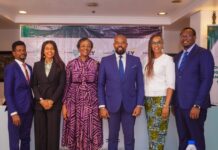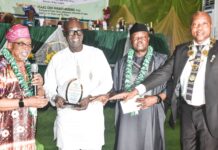
Does rap, jazz or reggae music influence voters? Perhaps not, economists believe that the most influential melody is from the ‘economic choir.’
Next week Saturday, Nigerians will dance to the polls with the hope that their thumb print could decide who will be their next President?
First, will Nigeria’s young population come out to vote on February 16 or will
the trend be like previous Presidential elections?
History reveals that more than half of registered voters stay at home on Election Day.
But the stakes are much higher now. President Buhari recently suspended Judge Walter Onnoghen, the Chief Justice of the Supreme Court. The candidate of the leading opposition party, Alhaji Atiku Abubakar, has called for his reinstatement.
This leaves little doubt that the aftermath of Nigeria’s elections will be the more critical.
Neither of these candidates is expected to easily concede defeat at the polls.
Global crude oil price could spike or dip depending on how either candidate responds to the results.
Post election crisis in Nigeria would further increase the country’s risk rating. This will reduce the nation’s investment appeal to capitalists, stifle domestic output and potentially lead the nation to another recession.
Certainly, the 2019 Presidential election will be another laboratory test of Nigeria’s fragile democracy.
More than ever before, seventy three (73) Presidential candidates are in the race.
What would, could or should influence the final decision of voters?
Will it be tribal tunes, regional melodies, religious a cappella or solemn economic beats?
This is my assessment on the five (5) tunes that voters would consider
CORRUPTION BLUES
The Challenge
The 2019 report from Transparency International (T.I) scored Nigeria 2.7 out of 10. This was the same score it gave Goodluck Ebele Jonathan in 2012. Nigeria remains ranked among the bottom 20% of Transparency’s International corruption ladder.
Research by the National Bureau of Statistics (NBS) reveals that corruption is highest in the police and judiciary. In other words, without winning the fight against corruption in these institutions, it is unlikely for Nigeria’s corruption score to improve.
T.I also requires the executive Government to improve access to budgetary expenditure information if its corruption score is to improve.
The Ministry of Finance reveals that it has recovered over =N=12Billion from tax evaders, and the ministry of information asserts that that over =N=140Billion has been collected from public officials due to the whistle blower policy.
The inability of the Federal Government to easily win its court cases and jail those alleged to have stolen public funds would also influence voter’s decision. The Federal Government sings that the delay has been caused by a rather slow judiciary process.
While the court cases play on, the executive Government needs to develop new programs to eliminate leakages across ministries, departments and agencies.
The Opportunity
T.I is a credible institution and its corruption score should be taken seriously. However T.I only measures the perception of corruption within the public sector.
The Federal Government hums that its policies have reduced corruption in the private sector which T.I does not measure.
The introduction of Bank verification numbers (BVN) and the independence of the Nigerian Financial Intelligence Unit (NFIU) is expected to assist in monitoring and curbing illicit flow of funds, especially money laundering and terrorism finance. In the medium to longer term, this will reduce incentives to collect bribe and increase ethical operating standard across the several electronic payment channels in Nigeria.
Continuous process reforms, reviews and reappraisal are required especially in the police and judiciary.
- INFLATION BEATS
The Challenge
Nigeria’s reliance on imported goods makes it difficult for its Central Bank to use conventional monetary and fiscal policy tools to fight inflation.
As at January 2015, food import bill was approximately $665Million. It is an economic miracle that Nigeria’s food import has dropped to $160Million (October 2018). The Government now saves an average of $450Million per month from reduced reliance on imported food.
The reduced food import bill was used as part of a wider strategy to reduce inflation rate from 18% in January 2017 to 11% (December 2018)
This election season, the priority of the Central Bank of Nigeria (CBN) is to maintain a stable exchange rate. It is uncertain if the CBN will be able to keeping the inflation rate low while it continues to stabilize the Naira/Dollar exchange rate.
However, Nigerian voters are more concerned about ‘food inflation’ as opposed to headline inflation. Food accounts for 64% of private household expenditure.
Rising food prices leaves families with little to save. This is why ‘stomach infrastructure’ is a queer but rational strategy used by politicians.
Stomach infrastructure could still influence the outcome of the election.
| Import Bill of Major Agricultural Products (US$) (2014 – 2018) | |||||
| Product | 2014 | 2015 | 2016 | 2017 | 2018 |
| Sugar | 462,902,256.53 | 337,894,861.06 | 398,507,529.04 | 255,497,036.75 | 244,468,182.26 |
| Milk | 961,138,252.98 | 583,857,586.97 | 182,146,479.35 | 296,705,342.66 | 314,457,367.81 |
| Rice | 1,052,332,549.67 | 590,265,251.69 | 134,192,626.54 | 18,961,624.79 | 18,503,136.69 |
| Fish | 921,477,281.13 | 590,265,251.69 | 133,836,974.44 | 18,961,624.79 | 17,311,238.96 |
| Wheat | 6,931,078.04 | 4,364,198.20 | 381,587.35 | 309,400.00 | 339,183.32 |
| Total | 3,404,781,418.35 | 2,106,647,149.61 | 849,065,196.72 | 590,435,028.99 | 595,079,109.04 |
The Opportunity
The significant reduction in food import bill has reduced cost-push inflation.
In the last four years, the Federal Government says that over one hundred billion naira has been disbursed to the paddy aggregation scheme (PAS), National food security program (NFSP) and the FGN special fertilizer initiative.
Their objective has been to enhance domestic food production and productivity. Though there have been implementation challenges, these programs have created some new opportunities for micro, small and medium sized businesses in the agricultural value chain.
TRADE REGGAE
The Challenge
The International Monetary Fund (IMF) and World Bank have forecast a slowdown in global economic growth. Global economic growth in 2019 is projected to be below 5%. Nigeria will not be immune to a slowdown in global growth. While trade dispute between Asia, Europe and the United States of America (USA) is expected to continue, there is growing panic in Europe (Nigeria’s largest trading partner) over the implementation of Brexit.
My forecast is that it in the medium to long term developed countries will focus on trade protectionism. It would become tougher for Nigerian manufacturers to export finished products to Europe and America.
However, relatively few Nigerian business persons export products. The evidence is seen in Nigeria’s non-oil export value. Non oil exports contribute less than 10% to total exports.
This implies that next week Saturday, the feelings of domestic traders will play a more significant role than the mood of Nigeria’s few international business men and women.
Voters who are in micro, small and medium sized enterprises (ZMSME) would have great influence on Nigeria’s 2019 election.
The Opportunity
Despite the genuine fears of capital reversal due to global economic slowdown and domestic political risks. Venture capitalists and foreign investors spot opportunities in Nigeria.
The CBN had introduced a list of 42 items that do not qualify to access its foreign exchange window. While this hurt jobs, especially in Europe and America, it opens employment creation opportunities for the domestic production of these items.
Simply put, domestic trade sentiment and ease of doing business are factors that would influence voting decision.
- SECURITY POP
The Challenge
Most citizens have low trust in the police, while criminals trust that they would not be caught.
Poor security infrastructure at the borders and non-implemented border security procedures has made it easier for human trafficking and the illegal drug trade to flourish.
The factional leader of Boko Haram, Abu Musab al-Barnawi, has pledged allegiance to the Islamic State of Iraq and Syria (ISIS). They have reorganized and are recognized as Islamic State’s West African Province (ISWAP).
The domestic perception of safety and security would influence voter’s decision.
The Opportunity
Despite the growing concerns about Boko Haram and herdsmen attack. The international Global Terrorism Database (GTB) published by the Study of Terrorism and Responses to Terrorism (START) reveals that Nigeria is making some progress on security. There have been fewer deaths due to terrorism in Nigeria relative to its peak in 2014.
- WELFARE CALYPSO
The Challenge
The National Bureau of Statistics (NBS) says that twenty one million Nigerians are unemployed, while seventy million are employed. While unemployment keeps rising, the unemployment concerns in Nigeria goes beyond today’s Government.
The unchecked population growth rate of the 70’s and 80’s has led to an explosion in Nigeria’s labor force today. Nigeria now finds itself in an awkward position. Every day, fifteen thousand Nigerians enter the labor force looking for a job.
This unemployment challenge continues to grow because most registered businesses in Nigeria employ less than fifty persons. This leaves little doubt that employment, poverty and the standard of living would influence voting considerations.
The Opportunity
The growth of the corporate sector is a sure-fire way to create jobs.
The Central Bank of Nigeria (CBN) has created an initiative that allows banks to get up to a 100% refund on cash reserve ratio (CRR) when they fund new proposals and projects to the real sector. This is an innovative way to stimulate economic growth.
The approval of the new minimum wage is expected to increase domestic consumption (purchase of more goods and services). This could strategically support job creation.
Some notable economists say that the current social investment program remains the boldest social security project by a civilian Government in the history of the Nigeria.
Some voters could easily rate this as a drop of water in hell; others believe that little drops of water make a mighty ocean.
In the final analysis, “There is nothing wrong with change, if it is in the right direction.” – Winston Churchill
.Babajide Ogunsanwo is the CEO of The FactBox Co. and the Co-founder of Leadership-By-Data






